More Limine Installer fixes
Reported here:
https://forum.puppylinux.com/viewtopic.php?t=13986
Fixes posted by SteveS and Caramel. Github commit:
https://github.com/bkauler/woofq/commit/6b0025d1dd129ec9323946f3eb47a3e3e989b526
Tags: easy
Surgery on eyelid
A year ago, I posted about surgery on my thumb, after having drilled a hole through it.
Arrived home from hospital today, afer surgery on an eyelid. I'm posting about this, as it affects current projects, in particular the Meanderer trike project.
Photo taken yesterday, after surgery:

Technically, treatment was very interesting. I noticed that the
right-eye lower eyelid had a swelling, was red and sagging. Went
to my GP, he referred me to an eye specialist, who said he cannot
handle it and referred me the eye clinic of a public hospital.
The doctor at the hospital told me that there is so little flesh
to work with, that if he had to cutout the cancer, that he
confirmed is BCC, he would cut out more than necessary, to be on
the safe side. So he referred me to another specialist, a prvate
clinic.
This is interesting; the doctor at the private clinic has a technique for cutting out the cancer and no more. She has on-site testing, so she made a first attempt, then tested if there are good skin cells all around the incision; if not she sees where to have another go, and finally no cancer cells remain. In my case, two removals were performed. As there was about an hour wait after the first removal, she had to reapply local anaesthic for the second removal. Finally, she sewed the two eyelids together, then taped a patch over the eye.
Then I went home, then next morning went back to the public hospital, where the doctor finished the job. As a lot of the eyelid had been removed, he replaced it with flesh cut from my arm, upper inside. That was done under general anaesthetic, so I was out for the duration. The above photo is when back in my bed after the operation. I felt fine, but they wouldn't let me go, insisted that I stay overnight for observation. I got released at 9am this morning.
Have to go back to the hospital tomorrow, for the doctor to check his handiwork. Then in the coming weeks, will go back to have the stitches removed, first from the arm, then the eyelid.
I don't know if will be able to do much building of the Meanderer trike. Will go to the Men's Shed on Monday, and see how it goes. But, not having binocular vision imposes constraints. Difficult to guage depths. like, when I move a finger to the phone screen, can't see how far away it is; not easily anyway.
Coping OK on the computer, so will probably catch up with some
EasyOS work over the next few days.
Tags: admin
VeMoo leaning tadpole trike
I'm always interested in new tadpole trike developments. At one time I looked around for enclosed or semi-enclosed tadpole trikes (or quads), and in 2023 posted this report on the Pedilio and Veemo:
- Enclosed pedal-powered recumbent in production — November 22, 2023
So many of these startups claim to be starting production "soon",
or to have started limited production. But then, years later, they
have faded away. Just a quick glance at the Veemo site, it looks
like they have reached production.
I recently discovered another startup, the VeMoo trike; this one is particularly interesting, as it is a leaning design and also full-suspension. It is partially enclosed. Here is the website:
![]()
The VeMoo is intended to be in production in 2025. They are taking pre-orders, but I don't know the price.
I very much want to know how the steering and leaning works, but cannot find the precise details. There are videos, but they don't show much detail:
https://www.youtube.com/@VeMoo_Mobility/videos
However, I got a clue how the leaning works from this video by the "Laidback Bike Report" of the VeMoo at Spezi 2024 exhibition:
https://www.youtube.com/watch?v=mf6iN0zQ8Aw
The guy showed how it tilted, just by pushing it sideways. This means that it is a weight-controlled leaning; so you shift your weight to the side and it will lean. This is a "Type 1" leaning mechanism, that I posted about recently:
- Another look at tilting tadpole trike designs — February 25, 2025
However, the website describes it as a "pendulum suspension". From this I deduce that when sitting in it, it will have a natural tendency to stay vertical. But, lean to the side and it will tilt.
I cannot say how effective this leaning mechanism is; anyone who
has ridden one, let me know! You can post in the comments section
of my YouTube channel, or send me an email.
Tags: light
Meanderer trike project intro video
Previous blog post in the new "Meanderer" leaning full-suspension build-from-scratch DIY tadpole trike project:
- Meanderer trike front suspension plates — March 19, 2025
The intention is to make videos on YouTube as the project progresses; to get the ball rolling, I have created a brief intro video, that outlines what the project is about.
Don't expect much though; this is the first time that I have
video-ed myself. Used my phone selfie-camera, and when played
back, realised two main faults; firstly that I should have been
looking at the camera not at the screen, and secondly shouldn't
have wobbled my head around so much.
Anyway, here it is:
"Meanderer leaning full-suspension tadpole trike PART1"
https://www.youtube.com/@meanderinglight/videos
I'm not bothered about my photogenic lack, nor faulty technique, as this is introducing a technical project, and in future videos most of the time the camera will be pointed at the work underway, rather than myself.
Did start to learn how to use Flowblade video editor, but haven't
progressed very far.
Tags: light
Meanderer trike front suspension plates
Previous blog post in Meanderer trike project:
- Front wheel hubs for tadpole trike — March 12, 2025
The front of the trike will have suspension, with swing-arms (also known as A-frame or wishbone arms) and shock-absorbers. The swing-arms will hinge on two plates attached to the frame of the trike. The frame is a 25x25mm square tube, 3mm wall thickness. The plates are 110x175mm sheet, 5mm thickness. There will be extra bracing with angle, as illustrated:
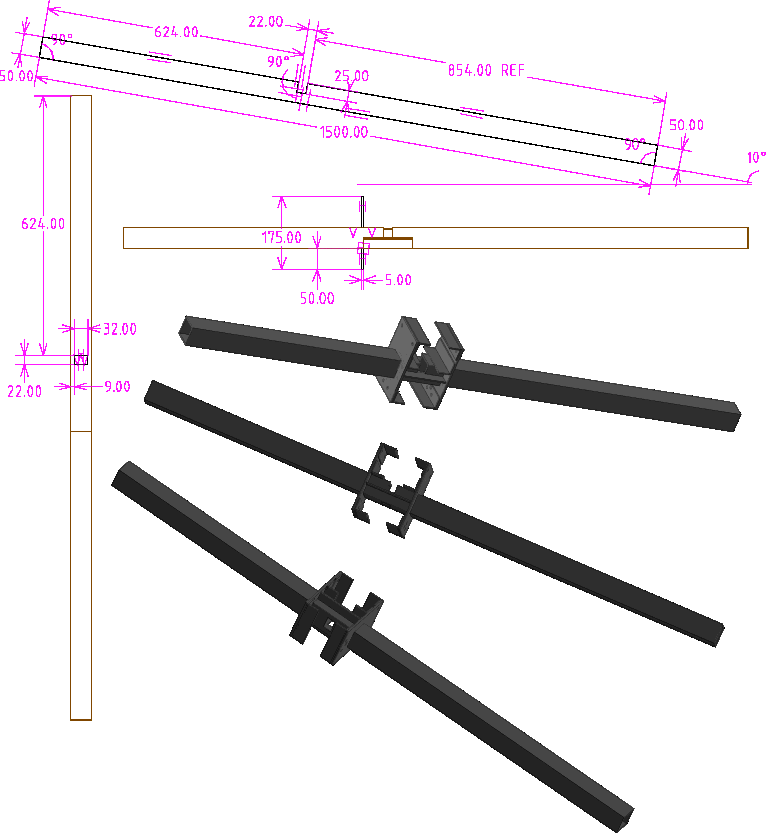
More construction details will be revealed, but for now, contructing just the two plates. They have holes and 50x50mm cutout:
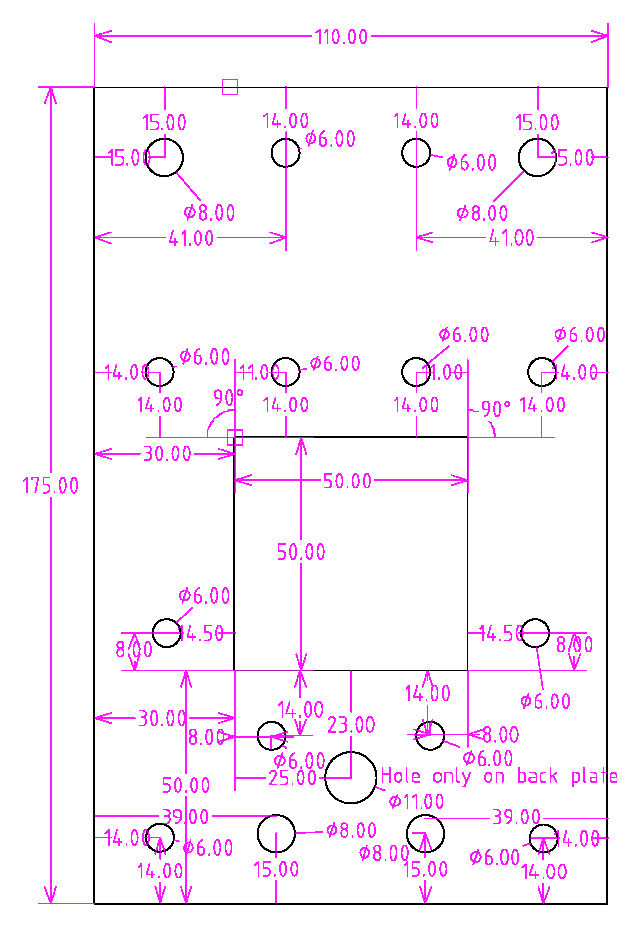
...regarding those 6mm holes; in fact, I used a 4mm drill bit, the intention being to later tap a thread for m6 bolts.
In an earlier blog post, there is a link to where I purchased the
5mm thick sheet. However, in retrospect I would have bought 6mm
sheet, as that is more common and discovered available locally at
a reasonable price.
I marked out the holes and cutout, then cut the plates on a metal bandsaw:
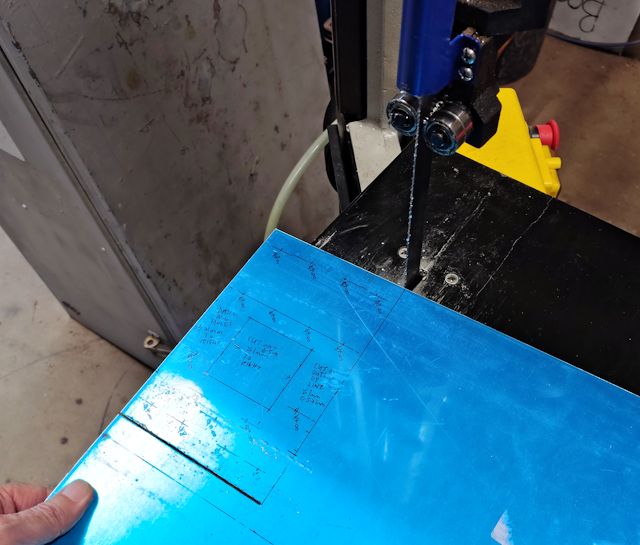
...yes, I know this project is intended to be do-able by anyone in their home workshop; a handheld jigsaw does the job OK also. In fact, I found that a jigsaw was the best choice for the 50x50 cutout.
Then put the two plates together, firmly clamped on a block of wood, and drilled the holes with a hand drill (after centre-punching):

...took the precaution of driiling 2.5mm pilot holes first, for
greater accuracy. For the 8mm holes, it would also be good
practice to drill another intermediate hole, say 5.5mm. The reason
is, large drill bits tend to wander off-centre, and a pilot hole
keeps them centred.
The 50x50 cutout... expected that to be tricky. We started to do it on a large metal router at the Men's Shed:
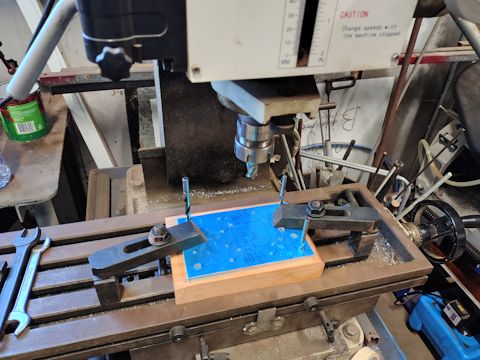
...no, not appropriate for a DIY guy in the home workshop! Besides, we decided that it is a clumsy way to do it. Instead, used a hand jigsaw. Firstly, took off the protective plastic, then re-marked the 50x50 cutout:

...the four 8mm holes are the suspension hinges for the
swing-arms, and the 50x50 cutout has to be symmetrical. I drew
lines on the outside of the 8mm holes, to help with measuring
symmetry.
I had previously drilled 3mm holes in the corners of the cutout, which we thought might be useful. But in retrospect, probably not. Or maybe just smaller, like 2mm.
Anyway, got the cutout re-marked, then drilled 10mm holes in opposite corners, as close to the marked lines as possible. Then used a square file to make the corners square, for insertion of the jigsaw blade. I used one of the jigsaws in the Men's Shed; it already had a blade in it, didn't know if for wood or metal, but it did have fine teeth, which I wanted:
 |
 |
...yes, nice cutout. Just cut one plate, then used that to re-mark the second.
A bit of fine-tune filing was required, then it was able to slide snuggly onto the 50x50 tube:
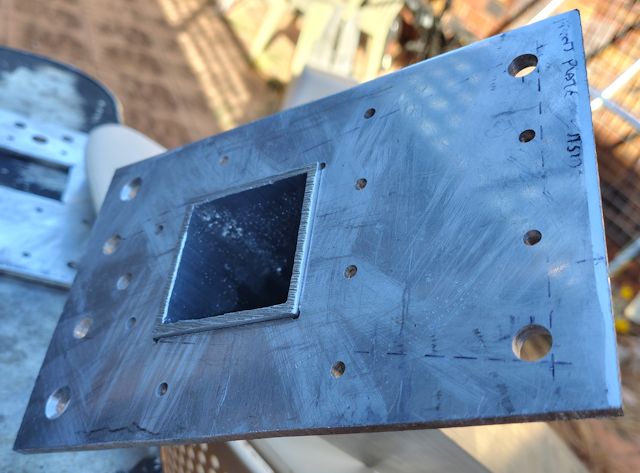
...notice those two holes in the bottom corners; countersunk. The
two closer-in are the 8mm holes for the swing-arms, the two outer
holes were supposed to be drilled with a 4mm drill bit, for later
tapping for m6 bolts. However, a lapse in concentration and I
drilled 6mm holes. So decided instead they will be countersunk
bolts.
So, what's next...
Tags: light
EasyAPT launch from menu
I posted about EasyAPT, a simple substitute for the Debian APT 'apt' CLI utility:
- NeoAPT simplified replacement for apt utility — March 16, 2025
To bring EasyAPT to the attention of users, I have added it to the "Setup" menu category:
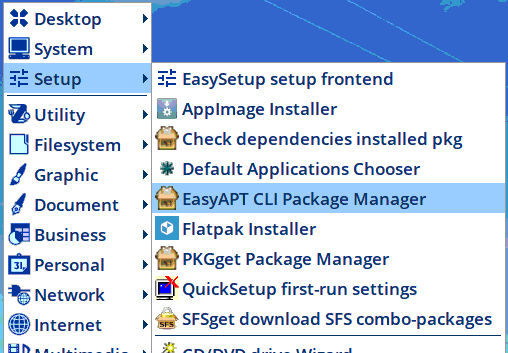
Selecting which, will open a terminal, with the help information for using 'apt' displayed:
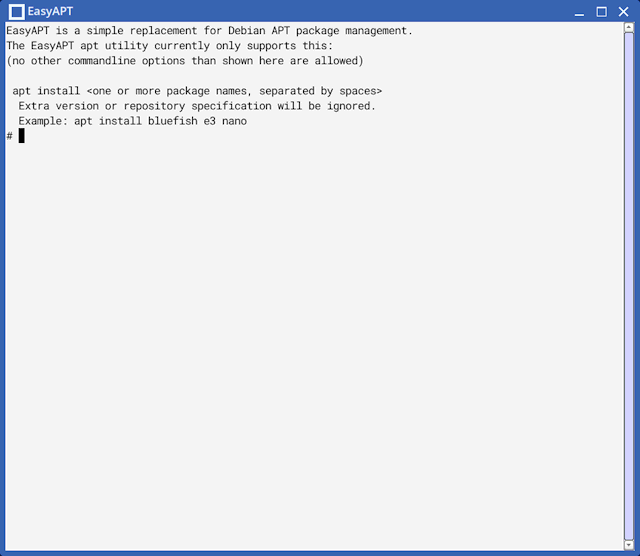
For now, very basic; will probably add more functionality
later.
Tags: easy
NeoAPT simplified replacement for apt utility
The question came up in this forum thread:
https://forum.puppylinux.com/viewtopic.php?t=14004
It is a convenience to run the 'apt' or 'apt-get' utilities in a terminal, to perform various package-management functions. One of those conveniences is to specify multiple packages to be installed.
EasyOS has a package management system that is different from Debian. PKGget, the EasyOS GUI program, can, in the case of Easy Daedalus, install from the Devuan/Debian package respositories. However, the package database format is different from that of Devuan/Debian, which means that the 'apt' utility won't work.
There are some Puppy distros that attempt to get 'apt' to work with the Puppy Package Manager (PPM), but it is a hack.
Another approach is to write a replacement for 'apt', that is just a wrapper for PKGget. I have got the ball rolling, to show how this works. There is a new directory, /usr/local/neo-apt, for now with a simple 'apt' script that only implements the "install" commandline option:
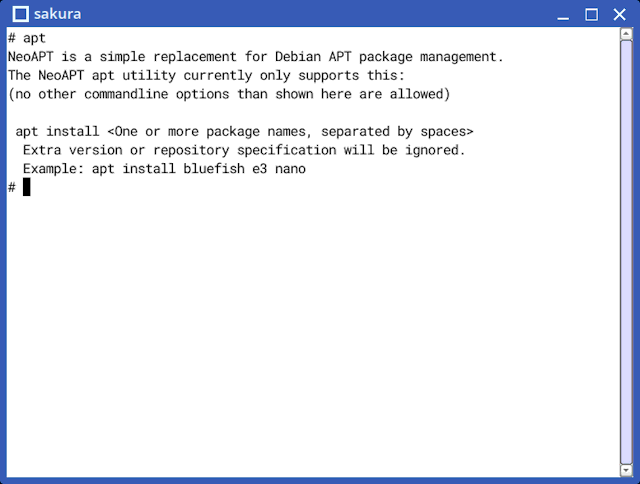
What it does is call PKGget for each of the packages specified on the commandline. So for the first one, PKGget will run:
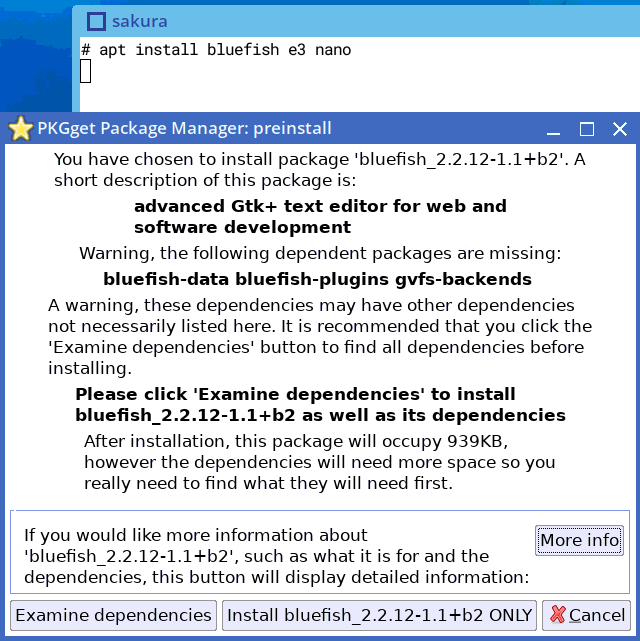
Which is a good thing, to have the GUI present you with all the required dependencies, rather than just blindly going ahead and installing a gazillion packages.
This is just a start; we could add "search", "update", "list", etc.
Note, this NeoAPT will work in Easy Scarthgap also. It has nothing to do with Debian package DBs, it is just a wrapper for PKGget.
Here are the github commits:
https://github.com/bkauler/woofq/commit/215a7417e87e8d4d0ce9593c9ca409715976f1de
https://github.com/bkauler/woofq/commit/5f6ac2782d43cbd92d88d1bf6b0fd72d044cf2a4
https://github.com/bkauler/woofq/commit/ea6241621a38cd9259b138865b9d3d4bbff91a19
As apt and related packages do not work in Easy Daedalus, have blacklisted them:
https://github.com/bkauler/woofq/commit/5a08374e6fa9d437ff925f34c9fc8c941068a2ff
Changing the subject, I have added some 'gvfs' packages to Easy Daedalus, as it seems needed by some filemanagers:
https://github.com/bkauler/woofq/commit/f11ede856b3405d580f0980403b92696cca2ec85
EDIT 2025-03-17:
Decided to change the name, from NeoAPT to EasyAPT.
Tags: easy
Kernel 6.12.19 compiled for Daedalus with AVS enabled
I have previously compiled the 6.12.x kernel in Easy Daedalus, but had problems with Xe video and AVS audio drivers, so turned them off:
- Linux kernel 6.12.12 configured without AVS and Xe — February 03, 2025
Decided to have another go, compiled 6.12.19 with AVS enabled, and sub-category "Intel AVS machine drivers" all enabled as modules. The failed audio had previously only occurred on my Acer Aspire 1; this time, audio works.
Interesting, running "dmesg", although 'snd_soc_avs.ko' has loaded, it looks like the legacy audio driver has grabbed the audio first.
With Easy Scarthgap and Daedalus, I reverted to the 6.6.x kernel,
specifically 6.6.67, and that's what is used in the latest
releases. But now, for Easy Daedalus, plan to go back to using the
6.12.x kernel. Maybe Scarthgap also.
Tags: easy
